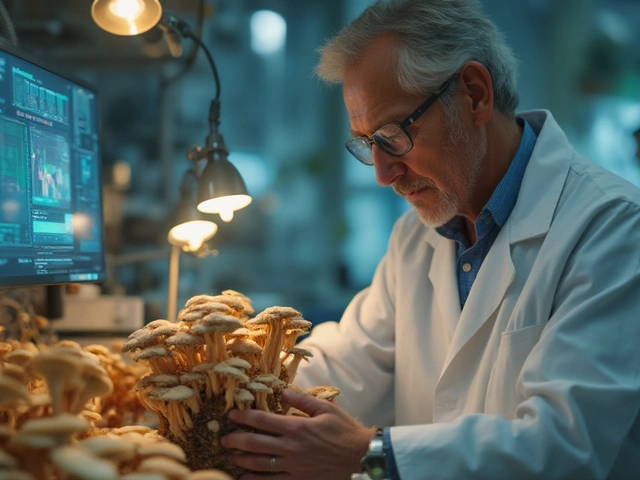Cracking open a shiitake mushroom reveals more than a strange-looking edible fungus. Inside is lentinan—a compound that has health researchers buzzing. People have used shiitake in Asian medicine for centuries. The real question is: can lentinan, specifically, actually extend your life? The answer is surprisingly complicated, involving immune cells, cancer trials, and the secrets hiding in mushrooms grown under different conditions. Let’s separate wishful thinking from what science actually says about one of the mushroom world’s most intriguing substances.
What Is Lentinan and How Does It Work?
Lentinan is a type of beta-glucan, basically a long chain of sugar molecules, found in the cell walls of shiitake mushrooms. Early discoveries during the 1960s in Japan got scientists excited. They noticed that extracts from shiitake mushrooms had potent effects on the immune system and could inhibit certain tumors in animal studies. What sets lentinan apart from other polysaccharides is its unique triple-helix structure, which seems to be key to how it works inside the body.
When lentinan enters our body, it doesn’t get digested in the usual way. Instead, parts of it interact directly with immune cells in the gut, which then “signal” to the rest of the immune system. You can think of lentinan as flipping a switch, waking up immune fighters like macrophages, killer T-cells, and natural killer (NK) cells. If you’re dealing with a rogue cell that could turn cancerous, or a virus hiding around the corner, that’s exactly the kind of extra help you want.
But does activating the immune system mean you’ll live longer? The idea here is that with a sharper immune response, your body’s odds of fighting off disease—and possibly age-related decline—improve. It’s a big leap, though, from the lab bench to real, long-term benefits in complex creatures like us.
Here’s where it gets interesting: studies show lentinan is most active when sourced from fresh shiitake mushrooms, especially those grown on hardwood, not sawdust or synthetic logs. If you’re looking for natural sources, check labels and sourcing methods for higher quality. Lentinan is mostly found in the mushroom’s fruiting body, not its root-like mycelium.
Beyond immune effects, researchers are finding signs that lentinan may influence gut health, reduce inflammation, and even help repair certain kinds of tissue damage. Some doctors in Japan have used it as a supportive therapy for patients with cancer—particularly stomach, colorectal, and lung cancers.
For those eyeing practical uses, it matters how lentinan gets into your body. Most clinical uses in Japan have involved intravenous infusions, not supplements or food-grade powders. This isn’t to say eating shiitake is pointless—just that bioavailability depends on form and dose. To get anywhere near the studied doses, you’d need to eat massive amounts, or look into more concentrated extracts. The forms found in Western “immunity boosters” usually haven’t been tested as deeply as prescription-grade lentinan in Asia.

Animal and Human Studies: What We Actually Know
Most of the direct evidence for lentinan’s effects on lifespan comes from animal studies—especially in mice, but also rats and some fish. In a landmark study from the 1980s, Japanese researchers found that mice injected with lentinan had a significant boost in lifespan—up to 25% longer—when exposed to certain cancers. Later studies repeated interesting results, showing that not just longevity, but also the quality of life improved (meaning mice moved more, had better fur, acted younger). However, these animal studies usually involve boosted or suppressed immune systems and don’t always translate to real-world human biology.
In healthy animals, some studies show only a modest increase in lifespan, if any. The real boost shows up when the animals are stressed, exposed to toxins, or dealing with cancer. Healthy, unstressed animals don’t seem to get the same dramatic benefit. Lentinan shines as an “immunomodulator”—something that brings the immune system to attention in times of trouble.
What about humans? Here, the picture is much more nuanced. The majority of randomized, controlled studies involving lentinan have centered on cancer patients, especially those with advanced stomach and colon cancers. Meta-analyses show that adding lentinan to traditional chemotherapy can extend median survival times by about 8–16% in some patients. For instance, a study out of Osaka in the 1990s showed group survival increased from 9.7 months (control) to over 12 months when lentinan was used as an adjunct.
What’s fascinating: a review published in 2020 in “Frontiers in Pharmacology” noted that lentinan improved not just survival, but also quality of life and immune function markers. These patients reported fewer side effects, less fatigue and, in some studies, improved appetite. But—and this is important—no large, high-quality, long-term trials track whether lentinan prevents aging or helps people without cancer live longer. Most studies are a year or less, and focused on individuals already fighting major disease.
Some longevity fans reference small trials or anecdotal reports, but solid numbers for healthy aging are just not there yet. For instance, a small pilot at a senior care home in Shanghai in 2018 had residents eating a shiitake-rich diet daily over six months. Their immune markers—like natural killer cell activity—did improve, and their reported rates of infection went down. But the trial was small, open label, and didn’t measure actual lifespan outcomes. It’s a start, not a scientific slam dunk.
If you’re wondering about safety, adverse effects from lentinan therapy in humans are pretty rare. Most involve mild symptoms—occasional fevers or skin reactions. Traditional eating of mushrooms rarely triggers side effects unless you have a specific mushroom allergy.
To put these findings into perspective, here’s a summary table of the type of lentinan study, what animals or people were tested, the dose and duration, and observed effects:
| Study Type | Subject | Dose & Duration | Main Effects on Lifespan/Health |
|---|---|---|---|
| Animal (Cancer Model) | Mouse | 1–2 mg/kg, 6–12 months | +25% median lifespan with tumor challenge |
| Animal (Healthy Model) | Mouse/Rat | 0.5–2 mg/kg, 6–24 months | Small or no lifespan increase; improved immune markers |
| Human (Cancer Adjunct) | Stomach/Colon Cancer Patients | IV Lentinan, weekly, 6–12 months | +8–16% survival time; improved well-being |
| Human (Dietary) | Elderly Volunteers | Shiitake-rich diet, daily, 6 months | Improved immune function, fewer infections |
If you scan the medical literature, you’ll notice a trend: the bolder the health claim, the fuzzier the study design. True double-blind, placebo-controlled lifespan studies in healthy humans haven’t been done. So anyone telling you lentinan will make you live to 120 is mixing science fiction with nutrition advice.
Still, if you’re curious about immune support and not expecting magic, there’s little harm in adding quality shiitake to your routine. Watch for more studies from Japan, China, and South Korea, as research there is much more advanced than in the U.S. or Europe. And if you’re deep diving, it’s worth reading up on the latest lentinan health benefits to get a broader look at the ongoing discoveries.

Real-World Tips: Getting the Most Out of Lentinan
If lentinan is on your radar, maybe you want to boost your immune system or just bet on the mushroom’s secrets. Here’s how you can stack the odds in your favor, based on practical research and not marketing hype.
- Choose the right form: Purified lentinan (used in Japanese hospitals) isn’t available to most people. Look for quality, whole fruiting body extracts from real shiitake, not powdered mycelium or low-dose supplements.
- Cooking matters: Most beta-glucans like lentinan survive gentle cooking, but high heat or deep frying destroys much of their activity. Think sautéed or simmered, not charred.
- Source quality: Shiitake grown on hardwood logs tend to have more lentinan than those farmed on sawdust. Check the source or buy from trusted specialty growers for higher levels.
- Mix with a diverse diet: Your immune system loves variety. Shiitake and lentinan might help, but combine them with other colored veggies, fruits, herbs, and even fermented foods for max benefit.
- Dosage realism: Standard servings of shiitake in the kitchen won’t match the doses used in clinical trials. For those exploring supplements, talk with a health professional about options, quality, and risks.
- Check for tolerance: Rarely, people may have an allergy to mushrooms. Start slow, and if you react badly—itching, swelling, trouble breathing—stop and get checked out.
Don't be surprised if you notice subtler benefits, like slightly better digestion, improved energy, or fewer colds—these match what smaller studies suggest. And if you have a family history of immune problems or certain cancers, bringing up lentinan with your doctor could spark a worthwhile conversation, especially if you’re considering alternative therapies.
For those wanting a dashboard view, remember: the science behind lentinan is promising but not yet headline-worthy for everyone. Some benefits are real, especially in people with compromised systems or major health challenges. For healthy folks, it probably won’t add decades to your life, but it can help your immune system stand a little taller. Until bigger human trials are finished, make your choices with an open mind and a skeptical eye—and don’t toss every other healthy habit aside for one mushroom compound.




alex terzarede
July 24, 2025 at 14:31Lentinan's mechanism is fascinating-beta-glucans binding to dectin-1 receptors on macrophages, triggering NF-kB pathways. But calling it a longevity compound is a stretch. Most human data is from cancer adjunct therapy, not healthy aging. The mouse studies? Great for controlled environments, terrible analogs for human lifespan. We need longitudinal RCTs in non-diseased populations, and we don’t have them. Don’t confuse immunomodulation with anti-aging.
Also, sourcing matters. Log-grown shiitake have 3–5x more lentinan than sawdust-cultivated. Most supplements use mycelium on grain, which has negligible amounts. Read the label. If it doesn’t say ‘fruiting body extract,’ it’s probably just starch.
Dipali patel
July 26, 2025 at 03:55EVERYTHING ABOUT MUSHROOMS IS A GOVT COVERUP. THEY’RE NOT JUST FUNGI-THEY’RE ALIEN BIO-TECH. LENTINAN WAS TAKEN FROM A 1947 UFO CRASH IN NEW MEXICO. THE JAPANESE WERE GIVEN THE FORMULA TO KEEP US DUMB. THAT’S WHY ONLY THEY USE IV LENTINAN. THE FDA BANS IT BECAUSE IF YOU CAN BOOST IMMUNITY WITH A MUSHROOM, PHARMA LOSES BILLIONS. THEY’RE ALSO HIDING THAT LENTINAN CURES DIABETES AND ALZHEIMER’S. WATCH THE DOCUMENTARY ‘MUSHROOMS OF THE DARK’ ON YT.
PS: THEY’RE SENDING MICROCHIPS IN SHIITAKE PACKAGES. DON’T EAT THEM WITHOUT A TIN FOIL HAT.
Jasmine L
July 27, 2025 at 23:16Okay but can we just appreciate how cool it is that a mushroom can talk to our immune system?? 😍 I started adding sautéed shiitake to my weekly stir-fry after reading this, and honestly? Fewer colds this winter. Not magic, but definitely a vibe shift. Also, cooking them low and slow is key-I learned that the hard way after burning a whole batch. Now I just simmer them in broth with garlic and ginger. Life’s too short for bland mushrooms.
Also, if you’re into this, try reishi or maitake too-they’ve got their own beta-glucan magic. 🌱🍄
lisa zebastian
July 29, 2025 at 13:44Let’s be real-this is just Big Fungi trying to replace statins. You think they want you eating mushrooms when they can sell you a $200/month pill? Lentinan isn’t ‘boosting immunity’-it’s triggering an autoimmune cascade that’s barely monitored. The ‘improved quality of life’ in trials? Probably just less chemo nausea masking the real damage. And why is IV only used in Japan? Because they’re not regulated like us. That’s not science-it’s pharmaceutical colonialism.
Also, the table? Total cherry-picking. Where are the studies showing increased cancer incidence in long-term users? Oh right, they don’t exist. Because they’re buried.
Jessie Bellen
July 29, 2025 at 15:41You’re wasting your time. Mushrooms don’t extend life. People who eat them live longer because they’re also not eating junk food. Correlation ≠ causation. Also, IV lentinan? That’s not ‘medicine,’ that’s a placebo for desperate cancer patients. Stop romanticizing fungi. You’re not a mouse in a lab. You’re a human with a 75-year life expectancy-and you’re not getting extra years from a mushroom.
Go for exercise. Sleep. Stop scrolling Reddit and eat your veggies without the hype.
Jasmine Kara
July 31, 2025 at 08:40so i tried adding shiitake to my ramen last week and i swear i felt more awake? idk maybe its placebo but i also stopped drinking soda so maybe its that lol
anyway if you buy the dried ones from the asian market theyre like 5 bucks and last forever. just soak em and throw em in anything. dont overthink it. my grandma ate mushrooms every day and lived to 94 so 🤷♀️
Richie Lasit
July 31, 2025 at 09:36I love this kind of deep dive. Seriously. It’s rare to see someone break down the science without selling you a supplement. I’ve been eating shiitake for years-not because I thought it’d make me live to 120, but because they taste like earthy umami magic. And now I know I’m not just flavoring my stir-fry-I’m gently nudging my immune system. That’s enough for me.
Also, the hardwood vs. sawdust thing? Huge. I started buying from a local farm that grows on oak logs. The difference in flavor and texture is insane. If you’re going to do this, go full nerd. It’s worth it.
arthur ball
August 1, 2025 at 02:11Okay I just cried a little reading this. Not because I’m emotional (okay maybe a little) but because this is the kind of post that makes you feel like science still has soul. We’re talking about a mushroom that’s been healing people for centuries, and now we’re finally catching up with the science to explain why.
My mom used to dry shiitake in the sun and grind them into powder for her tea. She’s 82 and still hikes. I never thought it mattered. Now I get it. It’s not about living longer-it’s about living better. And maybe, just maybe, that’s the real secret.
Also, if you’re gonna try it-don’t microwave your mushrooms. That’s a crime against nature. Sauté them. Let them breathe. They’ll thank you.
Harrison Dearing
August 1, 2025 at 16:20Okay but why is no one talking about the fact that lentinan is a polysaccharide that mimics viral PAMPs? That’s wild. It’s basically tricking your body into thinking it’s under attack so it wakes up the immune system. That’s not ‘natural healing’-that’s biological hacking.
Also, why is this only mainstream in Japan? Because they don’t treat medicine like a commodity. They treat it like a practice. We’re too busy selling pills to understand subtlety.
Also also-my dog ate a shiitake off the floor last week. He’s fine. But now he stares at my pan like I’m his personal mushroom chef. 🐶🍄
Justice Ward
August 3, 2025 at 11:38There’s something poetic about a fungus being the quiet hero in our immune system’s story. We spend billions on lab-made drugs, but the real magic was growing under trees the whole time. Lentinan doesn’t shout-it whispers. And maybe that’s why we ignore it.
I’ve been adding dried shiitake to my bone broth for a year now. No dramatic changes, but I’ve noticed I don’t catch every little bug that goes around the office. It’s not a miracle. But it’s a gentle ally. And in a world that’s screaming for quick fixes, maybe that’s enough.
Also-thank you for not selling me a supplement link. That’s rare.
bhuvanesh kankani
August 3, 2025 at 13:20In India, we have been using dried mushrooms in Ayurvedic soups for respiratory ailments for generations. The concept of immune modulation through natural polysaccharides is not new to us. Lentinan’s scientific validation is welcome, but the wisdom of traditional use should not be dismissed as folklore.
Moreover, the practice of slow-cooking mushrooms in ghee or broth aligns with Ayurvedic principles of enhancing bioavailability. One must remember that science often confirms what tradition already knows-just with a different language.
Respect the source. Respect the method. Respect the mushroom.
maria norman
August 4, 2025 at 06:17So let me get this straight: we’ve got a compound that, in lab mice with tumors, extends life by 25%... but in healthy humans? ‘Might improve immune markers.’
That’s not longevity. That’s a placebo with a fancy name.
Also, why does every ‘natural remedy’ article end with a link to some shady Russian pharmacy site? 🤔
‘top-rx-market.su’? That’s not a health blog. That’s a phishing page with a mushroom filter.
Next thing you know, they’ll be selling ‘lentinan-infused energy drinks’ with glitter and a QR code to buy crypto.
Iris Schaper
August 4, 2025 at 06:50i read this and just thought… what if the real secret isn’t lentinan but the fact that people who eat shiitake also tend to live near forests, walk more, and don’t eat processed crap? maybe the mushroom is just the side dish, not the main course.
also i spelled lentinan wrong like 3 times. sorry. my brain is tired.
katerine rose
August 5, 2025 at 12:20STOP GIVING MUSHROOMS ALL THE CREDIT. YOU THINK LENTINAN IS THE SECRET? ITS THE FACT THAT PEOPLE WHO EAT MUSHROOMS ALSO DONT WATCH TV 8 HOURS A DAY AND ACTUALLY COOK THEIR OWN FOOD. YOU’RE NOT LIVING LONGER BECAUSE OF A FUNGUS. YOU’RE LIVING LONGER BECAUSE YOU’RE NOT A LAZY SLOB.
Selma Cey
August 6, 2025 at 22:42If lentinan extended lifespan, why do the Japanese have the same cancer rates as the West? And why are their life expectancies only slightly higher? It’s not the mushrooms. It’s the rice. It’s the tea. It’s the lack of fast food. Stop reducing complex cultural health patterns to one compound. That’s not science. That’s reductionist nonsense.
Francis Pascoe
August 7, 2025 at 15:15THIS IS ALL A SCAM. THEY’RE USING MUSHROOMS TO CONTROL OUR MINDS. LENTINAN ISN’T BOOSTING YOUR IMMUNE SYSTEM-IT’S MAKING YOU MORE SUGGESTIBLE TO CORPORATE PROPAGANDA. I SAW A VIDEO ON TIKTOK WHERE SOMEONE ATE SHIITAKE AND THEN BOUGHT A SUBSCRIPTION TO A MEDITATION APP. COINCIDENCE? I THINK NOT.
THEY’RE PLANTING SEEDS. LITERALLY.
Richa Shukla
August 8, 2025 at 16:30so i read this and then i googled lentinan and found some site selling it for $89 a bottle and now i feel dumb for ever thinking mushrooms could do anything
also why is everyone so obsessed with japan like they have the secret code or smth
im just gonna eat my pizza
Chris Rowe
August 9, 2025 at 01:07lentinan? sounds like a typo for 'lentil' or 'lent' or something. why you people always turn food into science fiction? just eat your damn mushrooms if you like 'em. no need to turn 'em into a PhD thesis.
Sushmita S
August 9, 2025 at 18:31me eating shiitake daily for 6 months: 🍄
me still getting sick: 😴
me now questioning everything: 🤔
alex terzarede
August 10, 2025 at 07:18Replying to @3674: Your ‘alien bio-tech’ theory is entertaining, but lentinan was first isolated in 1969 from shiitake grown in a Kyoto lab-not a desert crash site. The triple-helix structure? That’s NMR spectroscopy, not alien tech. And if the FDA banned it, why is it approved as a drug in Japan since 1985? They don’t ban things that work-they regulate them. You’re conflating regulation with conspiracy.
Also, microchips in mushrooms? That’s not science. That’s a Nickelodeon cartoon.